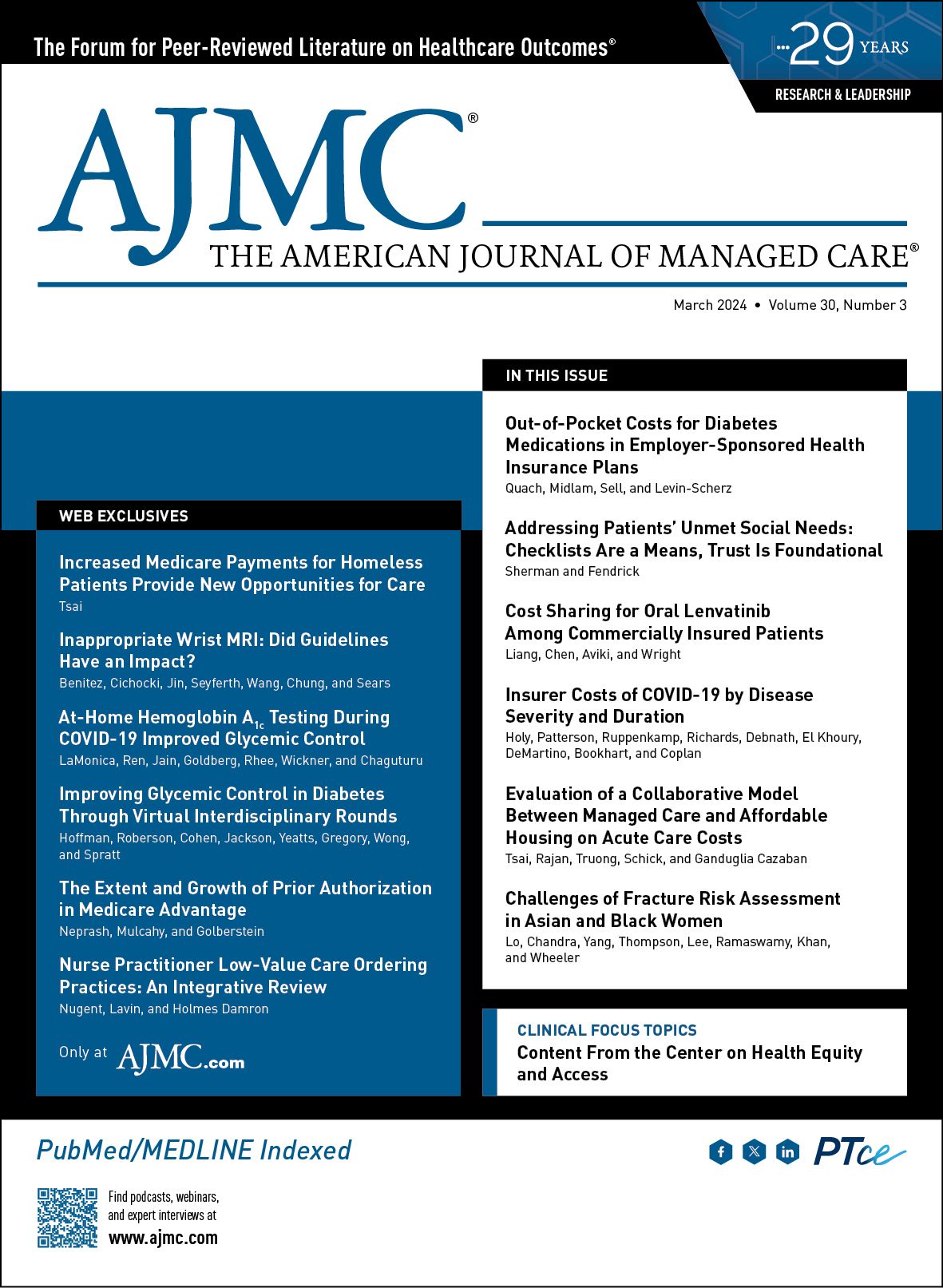- Center on Health Equity & Access
- Clinical
- Health Care Cost
- Health Care Delivery
- Insurance
- Policy
- Technology
- Value-Based Care
Out-of-Pocket Costs for Diabetes Medications in Employer-Sponsored Health Insurance Plans
Out-of-pocket costs of diabetes medications other than insulin can be quite high for individuals with employer-sponsored health insurance.
Am J Manag Care. 2024;30(3):107-108. https://doi.org/10.37765/ajmc.2024.89510
Takeaway Points
- The out-of-pocket costs of some noninsulin diabetes medications are higher than the out-of-pocket costs of insulin.
- Policy makers and employers designing health benefit plans should consider the total burden of out-of-pocket drug costs.
Public policy attention has focused on the out-of-pocket cost of insulin,1 but little information is available on out-of-pocket costs of other diabetes drugs. Rationing insulin due to cost is immediately life-threatening, but failing to take other antidiabetes drugs increases the risk of future medical complications. We used a deidentified extract of pharmacy claims data from the WTW RxCollaborative for calendar year 2021 to assess out-of-pocket costs for 4 classes of diabetes medications in employer-sponsored health insurance (eAppendix [available at ajmc.com]). This observational study of deidentified data required no institutional review board approval.
We analyzed a subset of claims from a database of employer-sponsored pharmacy benefit plans of more than 400 diverse large and small employers with 4.7 million members distributed widely geographically with collective spend of more than $5.5 billion. We identified 313,791 unique members likely to have diabetes based on paid claims for the equivalent of at least 12 months of 1 or more medicines commonly used to treat diabetes. We restricted our analysis to 121,657 members with prescriptions for diabetes drugs in the following classes: insulins, dipeptidyl-peptidase-4 (DPP-4) inhibitors (gliptins), sodium-glucose cotransporter 2 (SGLT2) inhibitors, and glucagon-like peptide-1 (GLP-1) agonists.
We converted days of supply to months of supply and removed claims that were reversed, such as those not picked up at the pharmacy. Rebates given directly to the patient at the point of sale were included, but we did not have access to data on co-pay coupons. Some individuals without diabetes might have been prescribed GLP-1 medications for weight loss.
The median (IQR) annual out-of-pocket spending was $327 ($144-$614) for insulins, $400 ($180-$675) for DPP-4 inhibitors, $430 ($240-$762) for SGLT2 inhibitors, and $480 ($240-$891) for GLP-1 agonists (Table).
Sixty percent of members analyzed were taking a drug in 1 of these 4 classes, 31% were taking drugs in 2 of these classes, and 9% were taking 3 or more classes of these diabetes medications. For patients with diabetes treated with a single drug, median annualized out-of-pocket spending on SGLT2 inhibitors and GLP-1 agonists was higher than out-of-pocket costs for insulins or DPP-4 inhibitors (Table). Median annualized out-of-pocket spending was higher for all 3 noninsulin medications than that of insulin for those taking a single agent. Mean and median annualized out-of-pocket spending were higher for those taking 2 or more classes of diabetes medications. The top decile of patients with diabetes taking 3 or more classes of diabetes medication spent close to $3000 a year in out-of-pocket costs for these medications.
This analysis shows that out-of-pocket costs for diabetes medications other than insulin can be quite high for patients with employer-sponsored health insurance and that many with diabetes are prescribed multiple drugs with high out-of-pocket costs. Low cost sharing for insulin is important but is not adequate to prevent potential financial toxicity for many patients with diabetes. Those designing health benefit plans should consider the distribution of expected costs for all medications used to treat diabetes.
Author Affiliations: WTW (formerly known as Willis Towers Watson) (JQ, CM, CS, JL-S), Arlington, VA; Harvard T.H. Chan School of Public Health (JL-S), Boston, MA.
Source of Funding: None.
Author Disclosures: Drs Midlam, Sell, and Levin-Scherz are employees of WTW and Ms Quach is a former employee of WTW, a consulting firm that works with pharmacy benefit managers to procure medications for employer-sponsored health plans.
Authorship Information: Concept and design (JQ, CM, CS, JL-S); acquisition of data (JQ); analysis and interpretation of data (JQ, CM, CS, JL-S); drafting of the manuscript (JQ, CM, CS, JL-S); critical revision of the manuscript for important intellectual content (JQ, CM, CS, JL-S); and statistical analysis (JQ).
Address Correspondence to: Jeff Levin-Scherz, MD, MBA, Harvard T.H. Chan School of Public Health, 677 Huntington Ave, Boston, MA 02115. Email: jlevin@hsph.harvard.edu.
REFERENCE
1. Amin K, Claxton G, Rae M, Cox C. Out-of-pocket spending on insulin among people with private insurance. KFF. March 24, 2022. Accessed July 5, 2023. https://www.kff.org/health-costs/issue-brief/out-of-pocket-spending-on-insulin-among-people-with-private-insurance/


